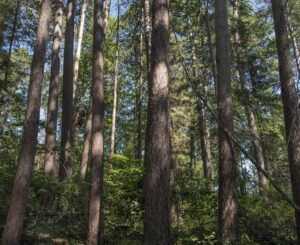 BY KEITH KARNES
BY KEITH KARNES
The Leech Lake Band of Ojibwe shares more boundary with the federally managed National Forest System than any other Tribe in the United States, with 75 percent of the reservation border adjoining the Chippewa National Forest in northern Minnesota. Being in the North Woods, timber harvesting and forest management are important to the Tribe’s economy. Yet, the value of the forest extends well beyond timber production. Forests provide the Leech Lake Band a deep cultural foundation, sustaining life for humans, plants, and animals, all while cleaning the air and water.
However, forest health has declined rapidly over the past two centuries. Clear-cut logging by European settlers combined with a management legacy of fire suppression and the impacts of climate change are increasingly exposing our forests to risks from severe wildfire, insects and disease, and drought. Many modern forests now lack a diversity of tree ages, especially older trees, which are a vital component of a healthy and resilient forest. Old-growth forest conditions are now present on just 13 percent of lands within federal national forests, and here in the State of Minnesota it’s less than half that amount.
The absence of older forests means a loss of vital habitat for important plants and animals. For example, old-growth forests are essential habitat for eagles, a doodem (clan) animal of the Leech Lake Band of Ojibwe. Eagles need very tall trees to nest and hunt, heights that can only be provided from old-growth forests. By protecting old-growth forests, we protect the vital habitat of the great American Bald Eagle.
While fire—including natural ignitions and cultural burning—contributes to the health of many forest ecosystems, the average acreage burned in the US has more than doubled in the past half century. The Federal Government now spends $7 billion to manage the escalating wildfire crisis. However, this $7 billion is only sufficient to conduct fuel treatments on 60 million of the 800 million forested acres nationwide.
Additionally, forests damaged by insects sequester 69 percent less carbon than healthy forests—the equivalent of adding 50 million tons of CO2, or the emissions of 10 million cars, into our atmosphere each year!
In light of these challenges, the US Forest Service is exploring ways to restore old-growth forests as part of a strategy to increase the resilience and health of national forests, both for the benefit of people and of nature. Specifically, these agencies are looking for ways to strengthen forest resilience by incorporating Indigenous Knowledge into forest management planning and practices.
Contrary to myths of “virgin” or “untouched” forests when Europeans first arrived on this continent, the evidence is clear that forests were actively taken care of by indigenous people for thousands of generations. And it is still that way today. Modern studies have shown that Native American land use increased the abundance of fire-tolerant, shade-intolerant and nut-producing trees up to 31 miles from indigenous settlements. Utilizing Indigenous Knowledge can help slow and even reverse the troubling trends in forest health.
The Leech Lake Band of Ojibwe knows how important a healthy and resilient forest system is for the livelihood of those living throughout northern Minnesota. They are excited to partner with the US Forest Service to share their knowledge of practices that will reduce the dangers of uncontrolled wildfires, increase long-term timber yields using sustainable forestry practices, and provide diverse habitats for numerous species, along with many other resources and values provided by healthy forests.
The reality is the federal government does not have the capacity to adequately manage the nation’s 193-million acres of national forests alone and forest health issues do not respect political boundaries. Fortunately, there are 574 federally recognized tribes across the United States with a deep connection to the land and unique understanding of forest and environmental relationships learned and passed down over many generations. Let’s expand engagement with Tribes – the original stewards of these lands – and work together to address the health of our nation’s forests so everyone can receive the benefits from healthy and resilient forests.
Keith Karnes began working for the Leech Lake Band of Ojibwe in 2006 and now serves as Forestry Director.























Thank you for your insightful thoughts on Indigenous stewardship and old-growth!